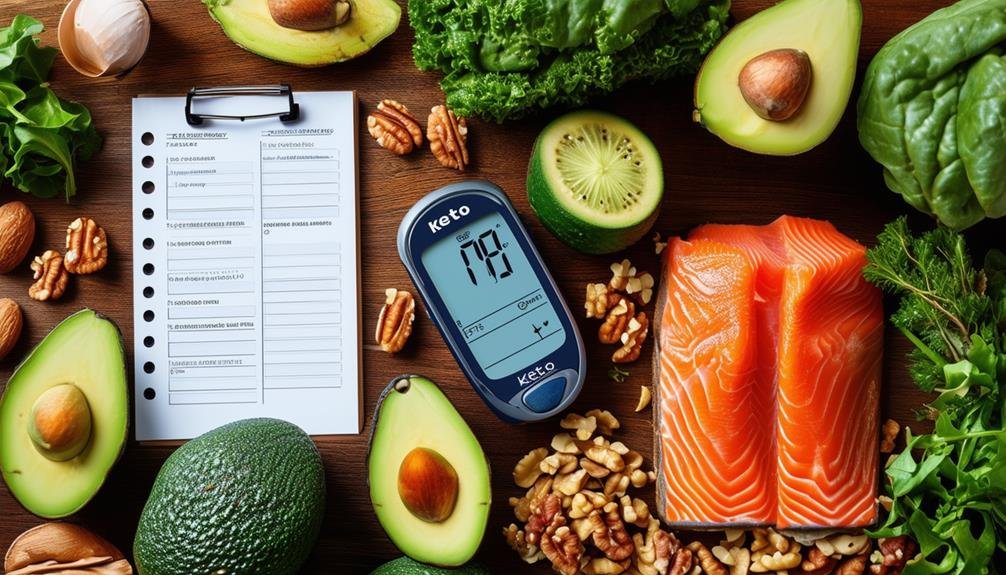Using a ketogenic diet can effectively help manage diabetes by stabilizing blood sugar levels and enhancing insulin sensitivity. By decreasing carbohydrate intake to below 50 grams per day, the body starts using fat as its main energy source. This metabolic shift can lead to weight loss and may contribute to lower A1C levels, particularly in individuals with type 2 diabetes.
When planning meals, it is vital to focus on low-carb foods, such as leafy greens, avocados, and fatty fish, while steering clear of grains and sugars. Regular monitoring of both blood sugar and ketone levels is essential for maintaining safety and effectiveness in this dietary approach.
It's strongly recommended to consult with healthcare professionals to tailor the ketogenic plan to your individual needs. Their expertise can provide valuable guidance and ensure a safe and successful journey in using this dietary strategy for diabetes management.
Key Takeaways
The ketogenic diet involves significantly reducing carbohydrate intake, which can lead to improved blood sugar control and enhanced insulin sensitivity for those managing diabetes. To enter ketosis, aim for a macronutrient distribution of approximately 70-80% fats, 15-25% protein, and 5-10% carbohydrates.
Consistent monitoring of blood sugar and ketone levels is vital to ensure safe adaptation to this dietary approach, particularly for diabetes management. It's important to consult with healthcare professionals to make necessary adjustments to insulin dosages and to mitigate risks such as diabetic ketoacidosis when following a ketogenic diet.
Additionally, complementing the ketogenic diet with holistic practices like regular physical activity, quality sleep, and effective stress management can further improve overall diabetes control.
Understanding Diabetes and Keto
Understanding how diabetes impacts your body's ability to process carbohydrates is crucial when considering the ketogenic diet as a management option. Diabetes often leads to insulin resistance, complicating blood sugar control. The ketogenic diet addresses this by significantly lowering carbohydrate intake, prompting your body to enter a state of ketosis. In this state, fat is utilized for energy instead of glucose, potentially enhancing blood sugar regulation and insulin sensitivity.
For many individuals managing diabetes, adopting a ketogenic diet can facilitate weight loss, which further aids in diabetes management. Research has shown that individuals with type 2 diabetes may experience improved glycemic control, with some achieving an A1C level below 6.5%. Furthermore, people with type 1 diabetes may notice a reduction in their insulin requirements with a ketogenic approach; however, careful monitoring of blood glucose and ketone levels is essential to prevent complications such as diabetic ketoacidosis.
The American Diabetes Association advocates for personalized meal planning, highlighting the importance of individualized approaches to dietary management. The effectiveness of the ketogenic diet can differ from person to person, underscoring the necessity of seeking professional guidance from a healthcare provider. Understanding these considerations equips you to make informed decisions about how a ketogenic diet may assist in managing your diabetes more effectively.
Benefits of the Ketogenic Diet
The ketogenic diet offers significant benefits for managing diabetes, primarily through the stabilization of blood sugar levels and improved insulin sensitivity. By reducing carbohydrate intake to less than 50 grams per day, individuals can minimize glucose fluctuations, which often complicate blood sugar control. This approach not only helps maintain steady blood glucose levels but may also enhance insulin sensitivity, potentially facilitating weight loss. Notably, research suggests that approximately 50% of participants experience remission, achieving an A1C level below 6.5% in a recent study.
Additionally, one of the notable benefits of the ketogenic diet is the potential decrease in the need for diabetes medications. Many individuals report a reduction in insulin dosages when adhering to this diet, contributing to better overall diabetes management. The focus on healthy fats, including omega-3 fatty acids and monounsaturated fats, can positively affect cholesterol levels and decrease inflammation, thus promoting cardiovascular health.
Nevertheless, while the benefits of the ketogenic diet are considerable, it's crucial to consistently monitor blood sugar and ketone levels. This vigilance helps prevent risks related to low blood sugar, such as hypoglycemia, as well as serious conditions like diabetic ketoacidosis (DKA). Consequently, individuals managing diabetes with a ketogenic diet can experience substantial health improvements, provided they maintain careful monitoring and responsible management as integral parts of this lifestyle change.
Meal Planning and Food Choices

Planning meals for a ketogenic diet requires careful food selection to meet macronutrient goals and maintain stable blood sugar levels. The ideal macronutrient ratio is roughly 70-80% fats, 15-25% protein, and 5-10% carbohydrates. This balance promotes ketosis, which is essential for effective diabetes management.
Incorporate low-carb foods such as leafy greens, avocados, and fatty fish, while steering clear of high-carb items like grains and sugary snacks to stay within carbohydrate limits. Including prebiotic fiber from sources like asparagus, leeks, and garlic can enhance fasting blood sugar levels, positively impacting overall health.
Meal planning is crucial. Utilizing apps or food diaries can help you track macronutrient intake and maintain adherence to dietary limits. Regularly monitoring blood sugar and ketone levels is vital to making necessary adjustments and preventing complications, such as hypoglycemia or diabetic ketoacidosis.
Here's a helpful reference table for your food choices:
| Food Category | Examples |
|---|---|
| Low-Carb Vegetables | Spinach, kale, cauliflower |
| Healthy Fats | Olive oil, coconut oil, nuts |
| Protein Sources | Chicken, salmon, eggs |
| Prebiotic Fiber Sources | Asparagus, leeks, garlic |
| Snacks | Cheese, beef jerky |
With this structured approach, you can create a balanced ketogenic meal plan that supports your health needs.
Monitoring Blood Sugar and Ketones
Regular monitoring of your blood sugar and ketone levels is essential for effective diabetes management while following a ketogenic diet. Tracking these levels allows you to maintain optimal glucose control, adjust your insulin dosages as needed, and prevent potential complications. It's advisable to measure your blood sugar several times each day, particularly after meals, to gauge your body's response to dietary modifications.
In addition to blood sugar monitoring, frequent testing of your ketone levels is crucial, especially during the initial adaptation phase to a ketogenic lifestyle. Keeping ketone levels within a safe range is critical to avoid diabetic ketoacidosis (DKA), a serious and urgent medical condition. Blood tests offer real-time insights into your ketone levels, while urine tests provide information on past levels, giving you a more comprehensive view of your ketone status.
Be vigilant for symptoms that may indicate elevated ketone levels. Warning signs such as fruity breath, increased urination, and excessive thirst require immediate testing. If you notice any of these symptoms, seek medical attention without delay.
Collaborating with healthcare professionals can help you establish personalized monitoring strategies and select the appropriate equipment to suit your needs. Some blood glucose monitors also have the capability to measure ketones, effectively combining two essential aspects of diabetes management into one device. By maintaining diligent monitoring, you're making significant strides in managing diabetes effectively while adhering to a ketogenic diet.
Risks and Precautions

Following a ketogenic diet while managing diabetes involves navigating specific risks and implementing necessary precautions. Understanding potential complications, particularly diabetic ketoacidosis (DKA), is crucial, especially for individuals with type 1 diabetes. If insulin dosages are not adjusted appropriately, the risk of DKA— a severe and potentially fatal condition— increases significantly. Regular monitoring of blood glucose and ketone levels is essential to prevent such dangerous health outcomes.
Though many individuals may achieve success with the keto diet, it's important to acknowledge potential side effects, including bad breath, dizziness, fatigue, nausea, and gastrointestinal disturbances, which can challenge adherence to the diet. Furthermore, the restrictive nature of the ketogenic diet may lead to nutrient deficiencies, impacting overall health.
Before initiating a ketogenic diet, it is imperative to consult with healthcare providers. Individual responses to the diet can vary widely, and personal modifications may be necessary to ensure both safety and effectiveness.
Below is a summary table highlighting key risks and precautions associated with the ketogenic diet:
| Risks | Precautions | Key Actions |
|---|---|---|
| Diabetic Ketoacidosis (DKA) | Adjust insulin doses as needed | Regularly monitor ketone levels |
| Nutrient Deficiencies | Consider supplementation when necessary | Consult healthcare providers |
| Side Effects | Track symptoms and monitor changes | Maintain hydration and proper nourishment |
| Dietary Mismanagement | Plan meals with care | Keep a detailed food diary |
Holistic Approaches to Wellness
A holistic approach to wellness encompasses various aspects of health, including diet, exercise, sleep, and stress management. Each of these elements is crucial for effectively managing diabetes and improving overall health. By addressing these areas collectively, you can enhance your blood sugar control and insulin sensitivity.
To implement a holistic strategy, consider the following key components:
- Dietary Modifications: Transitioning to a ketogenic diet may help stabilize blood sugar levels and lower the risk of diabetes. Prioritize whole foods and balanced nutrient intake to tailor your nutritional plan to your individual needs.
- Regular Exercise: Incorporating both resistance training and aerobic workouts into your routine can significantly improve insulin sensitivity. Strive for a balanced exercise regimen that includes both forms of physical activity to reap the maximum benefits.
- Sleep Quality: Aim for 6-8 hours of restorative sleep each night, as sufficient sleep is essential for effective blood glucose regulation and can reduce the risk of diabetes complications.
- Stress Reduction: Employing stress management strategies such as yoga, qigong, or meditation may greatly lower blood sugar and insulin levels, thus supporting comprehensive diabetes care.
Frequently Asked Questions
Do Doctors Recommend Keto for Diabetics?
Doctors do not universally endorse the keto diet for diabetics. Instead, they emphasize personalized meal planning, careful low carbohydrate intake, and the assessment of individual health risks. It is crucial to regularly monitor glucose levels, consider the process of fat adaptation, and assess long-term impacts based on patient experiences.
Can I Reverse Diabetes With Keto?
Can you reverse diabetes with the ketogenic diet? Yes, by replacing carbohydrates with healthy fats in your meal planning, you can enhance insulin sensitivity and potentially achieve weight loss. However, it is essential to be aware of the potential health risks and long-term implications associated with making such lifestyle changes. Always consult with a healthcare professional before making significant dietary adjustments.
Should Diabetics Go Into Ketosis?
Diabetics should carefully consider the potential benefits of ketosis for blood sugar management while also accounting for the associated risks, such as strict dietary limitations and effects on insulin levels. Thoughtful meal planning and insights from other patients can guide the necessary lifestyle adjustments for sustainable results.
How Does Keto Lower Blood Sugar?
By adjusting your meal timing and significantly reducing carbohydrate intake, you can effectively lower your blood sugar levels. As your body transitions to utilizing fat for energy, you may experience enhanced insulin sensitivity and decreased glucose levels. This metabolic shift can lead to an increased metabolic rate and facilitate weight loss.
Conclusion
Incorporating a ketogenic diet into diabetes management can offer significant benefits, as research indicates that approximately 60% of individuals following a keto diet experience enhanced blood sugar control.
By understanding the fundamental principles of the diet and strategically planning meals, you can optimize your health outcomes.
However, it's essential to routinely monitor your blood sugar and ketone levels to ensure safety.
Always consult a healthcare professional to personalize your approach, which helps maximize the advantages of the ketogenic lifestyle while ensuring your well-being.
